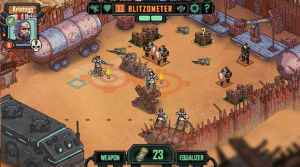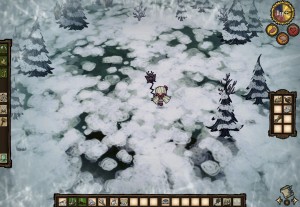The idea of supporting games and continuing game development way after their release has gotten serious traction over the last decade. We’ve talked about Team Fortress 2 as the prime example, but we’re seeing recent cases where developers continue to work on a title way after its release. Sometimes, this is for growing the brand or keeping the game alive, such as with Payday 2. Then there are the situations where a developer tries to right a wrong or recover from serious launch problems, such as Planetary Annihilation or Skyshine’s Bedlam.
Whatever the case, it does bring up an interesting discussion on game development and how this affects both the developer and consumer.
Going the Distance:
As we’ve talked about previously, most games are designed around a single development timeline with short-term post release support for any patches or fixes. If a game does well enough, the developer may work on an expansion or DLC, but eventually they will move on to another project.
Long-term development means that the developers will continue supporting a game with a combination of free and paid content and continued bug fixes and refinement. It’s almost like having a game in early access, but with the fact that it’s already considered done.
Recently, we could also put Prison Architect into this category as well, because Introversion is still working on the game and delivering patches for it. The big example that I’ve been experiencing is Payday 2 which I’ve talked about in previous posts. To briefly recap, Overkill has turned six months of post release support into multiple years with continued refinement and changes to the gameplay.
Then there are cases as I mentioned where a game is a dud at release; forcing the developers to either leave the game to fail or continue working on it in an attempt to scavenge it. Planetary Annihilation is a big example of this and I spent an entire post talking about what went wrong with it.
After release, fans who were waiting for a complete experience found Planetary Annihilation to be a buggy, incomplete title that was only meant for the hardcore audience. Uber Entertainment spent the next year continuing to patch the game and add in content that was meant to be included at launch. Afterwards, they re-released the game under the Titan moniker which everyone who bought the original got for free. The Titan version featured completely rebalanced content along with all the bug squashing and fixes Uber added.

The changes made to Skyshine’s Bedlam with the Redux update have radically changed how the game was compared to launch
Skyshine’s Bedlam is an interesting case and one that I talked to the developer about on the podcast. The game for all intents and purposes was done at launch; nothing was missing, all features were in and the game was stable.
The problem this time was that the game met with a huge backlash from people having problems with the design and mechanics (including yours truly.)
What the developers did was listen to the community and continued working on the game to change the systems around: Adding in a new mode, revising combat and the UI, changing progression and making the game easier for new players.
As of a few weeks ago, Skyshine’s Bedlam was re-released under the “Redux” brand, featuring all the changes and the developers are still working on the game.
Continuing to work on a game can lead to making a game better and raising developer goodwill, but it does present some new debates and issues around selling a game.
A Gamble:
The use of post-release support inevitably means that a game is going to be changing and growing after its launch, but this does change the perception of the game from a developer and consumer viewpoint.
For developers, it means that they’re going to be spending more time and money working on a game, with no guarantee that the continued support will pay off. In Planetary Annihilation’s case, the entire year that they were working on fixing the game, they weren’t making anywhere near the sales figures they were hoping for, and I’m not sure if Titan has earned enough back to cover the cost.
With Skyshine’s Bedlam, it’s still too soon to say whether or not the Redux upgrades will help, but if the developers didn’t do anything, the game would have been left in a much poorer state for the consumer. There is also the expectation that the developer has to manage; letting people know what will be the state of the game after release. Some developers don’t want to continue working on the same game; they’d rather finish bug fixing and then move on to their next idea, or the game may not support continued development.

Payday 2 has been changed so much from the original concept, that the game is no longer the same experience from the retail version
It’s crucial that the developers lay out exactly what their plans are around the time of launch; even if that means saying that they will support the game if it sells well. It may seem like you’re holding content hostage, but it’s far better than saying nothing and leaving consumers guessing about your continued plans.
Speaking of consumers and managing expectations, you need to be really careful with how you support a title, or it can blow up spectacularly
Not as Advertised:
There is a difference in perception between working on supporting a title vs. just releasing a sequel. When you support a game, it means that all the changes are going to affect that product; leaving the consumer with something that is always changing from their original purchase. With a sequel, the original content remains preserved and someone can go back to it if they so choose.
For games that are designed around long-term support, you need to take a careful hand when it comes to changing the experience and make sure people know what’s coming. Overkill Software had a massive backlash last year following changes to Payday 2’s gameplay. Since the release, Payday 2 has added in a prestige mode, multiple new weapons, redesigned stealth and missions and new enemies.
Last year, they decided to add in an economy system; bringing monetization elements to the game where no one was asking for it originally. The system became a contradiction of what was originally promised and was Overkill trying to triple dip on Payday 2 between buying the game, buying DLC and now the monetization aspect. The backlash was so great, that it forced Overkill to completely change how they handled communicating to the community in an attempt to calm the masses.
Since then, things have settled down and with more support along the way, the next big change at the moment is that Overkill is completely redoing the progression and character development system of the game.
With that said, Payday 2 is a good example of both the risks and rewards of long-term development. The game and Overkill have earned more acclaim and recognition than they would have ever gotten if they just kept to the original plan of six months of post support. On the other hand, the game is now in such a different state from where it was at launch, that there are fans who wish that Overkill would just work on a Payday 3 and leave the game alone.
This also creates the precedent of what happens when a game is changed so much from the original release that it’s not the same game anymore; does the consumer have any protection or options on their end? Even more importantly, if the developers don’t tell anyone about their game altering plans such as in Overkill’s case who again released the economy system and microtransactions without telling anyone (not even their admins) about it.

Klei Entertainment has worked on Don’t Starve for a long time, but it was after the game was proven to be a success and not changing the base foundation
With Skyshine’s Bedlam Redux, the developers have left in the original combat system for fans who enjoyed it, and they have been more than open about their plans and discussions with the community.
What Does the Future Hold?
We are seeing developers and publishers pushing for long-term game development, as being able to work on content for a game that you know has a stable fanbase already can be too good to pass up.
When it works, it allows a game to become bigger and more popular than it ever would have given the original development timeline.
But having a game change so much makes it difficult for people to jump in later on, and there is no guarantee that the fans will like all the changes.
While having a game become better over time is a great thing for developers, there is the nightmare of making a great game poor with certain design decisions and ruining it for the present and future. Not only that, but banking on turning a game into a long-term supported title to only have it come out to middling success can be just as bad.
For many developers, the pros outweigh the cons; if you are able to keep working on a successful game to make it better and provide more value, then it can be a win-win for everyone. It’s just important to keep in mind the foundation of your title and not to create something so radically different that you lose what made the game special in the first place.
If you enjoyed this post, please consider donating to the Game-Wisdom Patreon campaign. Your donations help to keep the site going and allow me to keep putting out great content.


